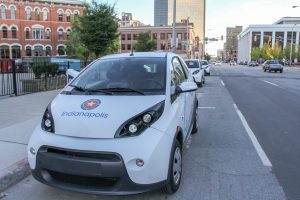Indianapolis is now the largest electric car sharing service in North America, according to the Director of Business Development for BlueIndy Bob Briggs.
BlueIndy is a 100 percent electric self-service car sharing service being introduced in Indianapolis, according to the project’s website www.blue-indy.com. Operated by the Bollore group of Paris, France, BlueIndy is a rental service of electric cars for convenient and affordable transportation throughout the Indianapolis area.
Briggs said that Indianapolis is a good place for a self-service car sharing company.
“Indianapolis as a city has a pretty poor transportation system,” Briggs said. “There are a lot of millennials and baby boomers moving back into the city, which this kind of service is great for.”
BlueIndy started with about 200 customers and now has more than doubled that number without advertising, instead depending just on word-of-mouth recommendations, according to Briggs.

“If we manage the growth, we can keep the service pristine,” Briggs said. “The Bollore group wants to do this the right way and not rush into the project, which could cause a logjam if there simply were not enough cars or stations to support a massive clientele base.”
Briggs noted that taking the time to complete all construction and cover all the bases before launching a big ad campaign will ensure that “Indianapolis will get the ultimate car sharing service.”
BlueIndy is modeled after Autolib’, a similar service in Paris also run by the Bollore Group; and by next year, Indianapolis will have up to 200 locations, 500 Bluecars and 1,000 charging points for individuals who own their own electric cars, Briggs said. Cities such as Milan and London also are expected to open similar projects soon.
With a station being built on Shelby Street, within walking distance of campus, many students will have the option of taking a Bluecar for a trip downtown or around the city.
Sophomore philosophy for pre-law major Reece McColly said that BlueIndy is a good opportunity for some students.
“BlueIndy seems great for anyone who doesn’t have a car or doesn’t want to pay for parking downtown,” he said.
According to the BlueIndy website, memberships for BlueIndy can be bought for a single day, a week, a month or a full year. A year-long membership, the most popular of the membership plans, Briggs said, costs $9.99 a month, with the first 20 minutes of any trip costing $4 and then each minute after that costing 20 cents per minute. To be a member, one must be 18 years old and have a valid driver’s license and credit card. A membership includes free GPS, 24/7 operator-assisted call service, available cars at any time of day and free parking. After buying a membership online, or through a kiosk at any station, the member swipes the membership card to unlock the car and unplugs the charger and then drives away.
The BlueIndy project, funded in part by Indianapolis Power and Light, will result in an increase of 4 cents per month in every IPL customer’s bill until the project is paid off, Briggs said. BlueIndy has signed a 15-year contract with the city of Indianapolis, with the average projected transaction being about $6.
“[It] will be a long time before we make money,” Briggs said. “It’s really a commitment from the Bollore group to the community.”
Briggs said the safe 100 percent electric car sharing service is not just a way to get away from a dependency on fossil fuels, but also is bringing jobs to Indianapolis. BlueIndy currently has 47 employees in Indianapolis and expects to have 100 employees by the end of the year, Briggs said, and the project also is indirectly creating jobs for the electricians and construction workers tasked with installing the 200 stations around the city.







